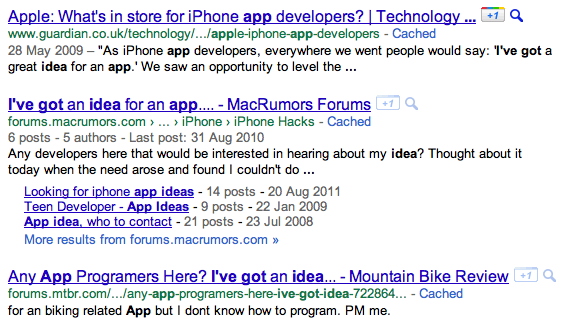Handling iPhone App Ideas
Posted on by Steve Workman About 3 min reading time
There's one question that I get asked a lot:
I've got this great idea for an app...... what do you think?
I run the mobile development team at my employer, a role that I really enjoy and feel privileged to be doing. I get to work with cutting edge technology, forward-thinking clients and brilliant developers and user experience experts. There's always a flip side, and for this role it is filtering out the bad ideas from the good ones.
The process I have a simple process for capturing and evaluating ideas: listen, write it down and do a quick estimate of effort and benefits. If the benefits do not heavily outweigh the effort, say thank you and move on.
That's it in a nutshell, but it's a bit more complicated than that. Lets step through the process.
Ideas An idea will come from one of two sources:
- The media, or
- A personal need
Ideas based in the media The request goes a bit like this:
Hi Steve, have you seen this article about this cool iPhone/android app? Well, I think we could do something similar (for the other platform)! It'd be great for [publicity/marketing/a demo/this client I have/making lots of money]. What do you think?
If I get a request like this alarm bells start ringing in my head. Clearly, someone else has already done this, and therefore has 3-6 months development time ahead if we were to start developing a rival app. Requests based on the media tend to be for porting android apps to iOS, and unless it's an android-only developer, there's likely to be a good reason why there's no iOS version. Take the BBC 3G strength meter app. It's only on android and I was asked if we could do an iPhone version. The answer was simply "no". The long answer was, "do you really think the BBC wouldn't have tried to make an iOS version? Of course they would have. It's not possible. iOS doesn't allow you that level of access to the phone's hardware."
The only time that an idea from the media would meet the benefits/effort threshold is if there was a direct client opportunity and the idea came from demand, rather than porting an app. Augmented Reality was a big buzz topic a few years ago, but finding a useful application for it for a client was a challenge, hence I didn't make an AR app.
So, unless there's a direct need for an app, it'll go into my big black book of ideas for a rainy day.

Ideas from personal need The best ideas for apps come from genuine need. You can quote me on that. When someone comes up to me and says,
I've got this problem, I need to ...... I thought it could work as an app?
I listen and I'm always much more hopeful. If someone has a need, then you can bet that other people have that need too. It may be something like large manuals or reference information for a specific sport e.g. SCUBA diving, or an app that collects a lot of information together and displays it usefully. These are the kinds of apps that I like people to talk to me about, and that straight away get to the top of the to-do list.
Which app to do first? This is a tricky question, but it should be one that you can answer. Follow this formula:
Potential audience * USP / effort
- Your potential audience, on a scale of 1-10 where 1 is "just you" and 10 is "every phone owner"
- USP (Unique Selling Point) on a scale of 1-10 where 1 is "It's a twitter app" and 10 is "best idea ever, never been done before, it'll revolutionise the way we live"
- Effort is a 1-10 scale of how long it'll take you to make the USP work (1 is short time, 10 is long time). It is not how long until you can get a first release out, it is how much effort will it take to create the hook for users.
So, for a basic twitter app, you will end up with a formula of 8*1/4 = 2. For an app for flight controllers, you'd get 3*7/7 = 3, so you'd be better-off spending your time on the flight controllers app. Either way, they're both not very high scores, so you may want to keep looking for better ideas.
Yes, I know it's a contrived example, and that it won't apply in every case, but give it a go if you are given a few ideas and don't know which one to do.
What next? Once you've got your good idea, don't ignore any other ideas that come your way. Keep writing them down, keep doing the analysis, and you'll always have an idea in your pocket to fall back upon. You may have so many good ideas that you'll have to hire some more developers to work on more apps, and that is a very good problem to have.
